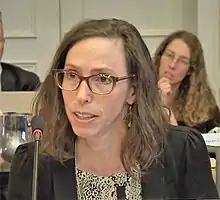Melissa Haendel
Melissa Anne Haendel is an American epidemiologist who is a Professor of Medical Informatics at the Oregon Health & Science University. She serves as Director of the Center for Data to Health (CD2H). Her research makes use of data to improve the discovery and diagnosis of diseases. During the COVID-19 pandemic, Haendel joined with the National Institutes of Health to launch the National COVID Cohort Collaborative (N3C), which looks to identify the risk factors that can predict severity of disease outcome and help to identify treatments.
Melissa Anne Haendel | |
|---|---|
 Haendel speaks at the National Human Genome Research Institute in 2016 | |
| Alma mater | Reed College University of Wisconsin–Madison |
| Known for | Bioinformatics |
| Scientific career | |
| Institutions | Oregon Health & Science University Oregon State University |
| Thesis | Identification and characterization of the novel gene, axotrophin, using an in vitro gene trap preselection method (1999) |
Early life and education
Haendel earned her undergraduate degree in chemistry at Reed College.[1] Her undergraduate dissertation looked at designing pharmaceuticals using molecular electrostatic potentials (MEPs) to construct quantitative structure-activity relationships.[2] She moved to the University of Wisconsin–Madison for her graduate studies, where she used in vitro gene trapping to study the gene axotrophin.[3] Her early career focussed on genetics and molecular biology.[4] In 2000 she moved to the University of Oregon as a postdoctoral researcher studying the role of thyroid hormones in the neural development of zebrafish.
Research and career
Haendel started working in healthcare informatics in 2004.[4] She switched the focus of her research from neuroscience and the biology of zebrafish to the development of resources for the Oregon Health & Science University library. She was promoted to Associate Professor of Medical Informatics in 2015.
Hanedel's research considers ontology development, biocuration and data harmonsation.[4] Biocuration assembles information from patient records, research outputs and medical literature to create a quality-controlled, computable format.[4] She is Director of Translational Data Science at the Linus Pauling Institute.[5]
Haendel believes that a globally consistent set of criteria, more comprehensive data collection, sharing and analysis will help to diagnose rare diseases.[6] Rare diseases are thought to impact 10% of the global population, meaning that there are considerable numbers of patients who are underserved by their healthcare systems.[7] In 2019, Haendel and the CD2H were awarded almost $9 million to make data related to cancer research more centralised and organised.[8] The Center for Cancer Data Harmonization makes use of a cloud-based portal to share data between physicians and cancer researchers across the country.[9]
During the COVID-19 pandemic, the United States had no standardised means to collect and share clinical data.[10][11] Haendel was concerned that the number of deaths and infections were not being accurately counted, and that this might compromise safe reopening.[12] In June 2020, Haendel formed the National COVID Cohort Collaborative (N3C),[13] which collates and analyses the medical record data of people with coronavirus disease.[14] The N3C looks to identify the risk factors that can predict severity of coronavirus disease and help to identify potential treatments.[14] It has work streams in data partnership, phenotypes, collaborative analytics, data harmonisation and data synthesis.
Selected publications
- Mungall, Christopher J; Torniai, Carlo; Gkoutos, Georgios V; Lewis, Suzanna E; Haendel, Melissa A (2012). "Uberon, an integrative multi-species anatomy ontology". Genome Biology. 13 (1): R5. doi:10.1186/gb-2012-13-1-r5. ISSN 1465-6906. PMC 3334586. PMID 22293552. S2CID 15453742.
- Day-Richter, J.; Harris, M. A.; Haendel, M.; Lewis, S. (2007-06-01). "OBO-Edit an ontology editor for biologists". Bioinformatics. 23 (16): 2198–2200. doi:10.1093/bioinformatics/btm112. ISSN 1367-4803. PMID 17545183.
- Shimoyama, Mary; Dwinell, Melinda; Jacob, Howard (2009-08-05). "Multiple Ontologies for Integrating Complex Phenotype Datasets". Nature Precedings. doi:10.1038/npre.2009.3554. ISSN 1756-0357. Missing
|author2=(help)
References
- "Melissa A. Haendel Ph.D. | OHSU People | OHSU". www.ohsu.edu. Retrieved 2020-06-28.
- Haendel, Melissa Anne (1991). Designing drugs: a new method using MEPs in constructing QSARs (Thesis). OCLC 268802607.
- Haendel, Melissa A (1999). Identification and characterization of the novel gene, axotrophin, using an in vitro gene trap preselection method. OCLC 608882841.
- "Melissa Haendel, PhD | AMIA". www.amia.org. Retrieved 2020-06-28.
- "Melissa A. Haendel". Linus Pauling Institute. 2018-03-21. Retrieved 2020-06-28.
- "Scientists suggest new solution to the rare-disease problem". EurekAlert!. Retrieved 2020-06-28.
- Haendel, Melissa; Vasilevsky, Nicole; Unni, Deepak (1 February 2020). "How many rare diseases are there?". Nature Reviews Drug Discovery. 19 (2): 77–78. doi:10.1038/D41573-019-00180-Y. ISSN 1474-1776. PMC 7771654. PMID 32020066. Wikidata Q89532791.
- "OSU awarded $8.8M grant to make cancer research accessible". KEZI News. Retrieved 2020-06-28.
- "Oregon State to help lead effort to make cancer research data more useful and accessible". Life at OSU. 2019-10-15. Retrieved 2020-06-28.
- sources, KTVZ news (2020-06-22). "OSU to use power of big data to help fight against COVID-19". KTVZ. Retrieved 2020-06-28.
- "Enlisting big data to accelerate the COVID-19 fight - News". UAB News. Retrieved 2020-06-28.
- Staff, Lincoln Graves, KATU (2020-05-18). "Accurate data on coronavirus still lacking in many areas". KATU. Retrieved 2020-06-28.
- "N3C Team". NIH NCATS.
- "NIH launches analytics platform to harness nationwide COVID-19 patient". National Center for Advancing Translational Sciences. 2020-06-15. Retrieved 2020-06-28.